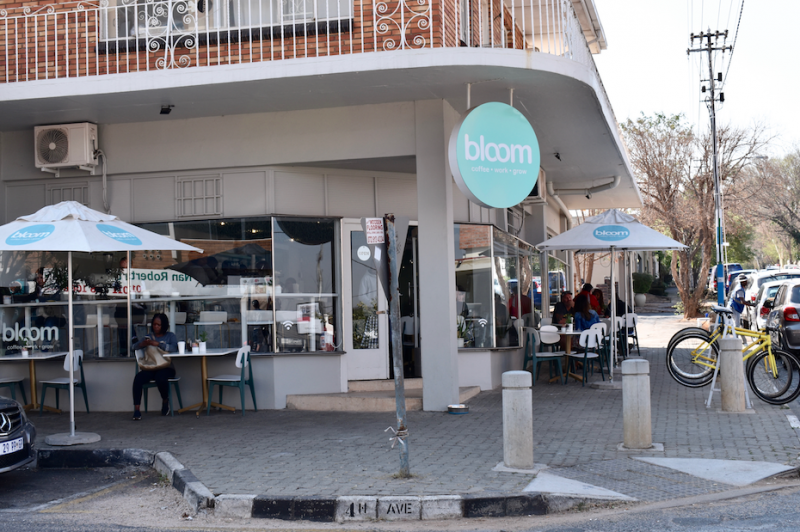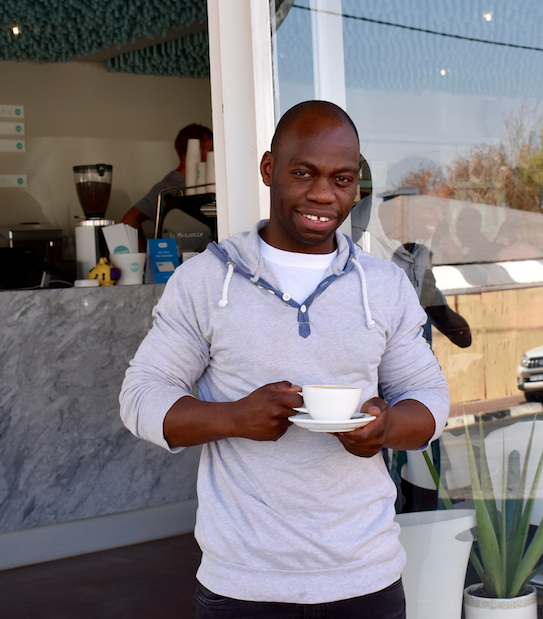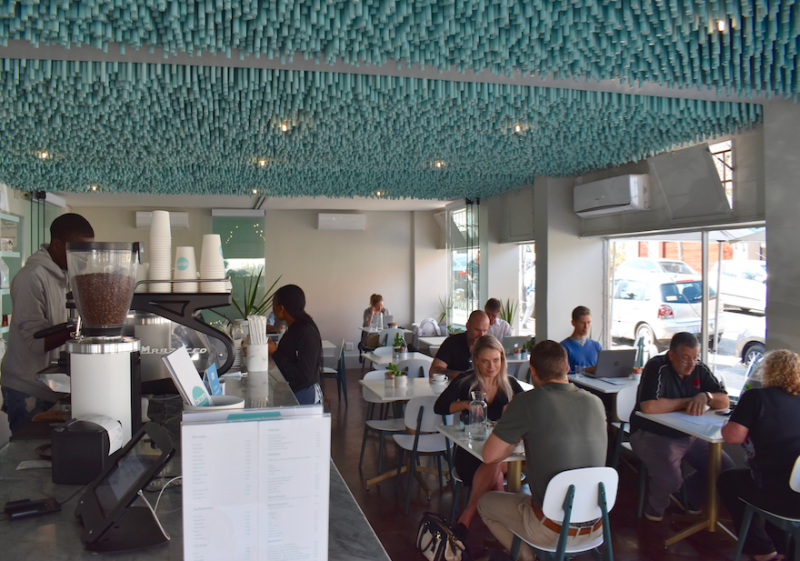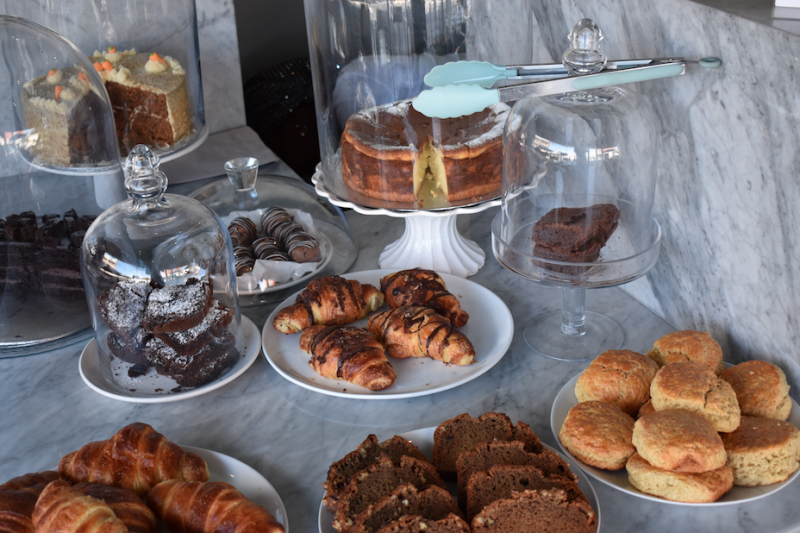Not just another café, this coffee space is part of the necessary shift in business ownership. They’ve got a plan. Can it work?
Words by Marijke Makomba

Bloom is the latest caffeinated addition to the Parkhurst 4th Avenue foodie strip in Johannesburg, South Africa. From the outside, this irresistible coffee shop looks trendy and inviting, but it aims to be much more than just an elegant eatery. Here, the main focus is to trial a meaningful transformative initiative where every employee has the opportunity to one day own a part of the business, or even open their own store. We sat down with Bloom’s Manager, Prince Ndlovu, to find out more about the people steering this example of systematic generosity.
Prince has been working in the hospitality industry for most of his adult life, and over the course of his career, he has taken on many different roles - from management, to barista, bartender, server, and even worked in the kitchen. He was always looking out for ways to expand his professional experience and knowledge, and also hoped it would simultaneously demonstrate his adaptability and commitment, resulting in better leadership opportunities. However, after working in the same position at the same restaurant for 6 years, he could see that his career was going nowhere, and he began to lose hope, “I felt trapped and so undervalued at work.”

But that all changed when he met the founders of Bloom. “I always dreamed I could own my own business one day, but I never thought it could happen for me - until I met Alan and Kgabo. When they told me about Bloom and all their plans and the future opportunities, I thought they must be joking!”
This is Kgabo Nkosi and Alan Gibson’s shared passion project: a response to the excruciating need for sustainable local job creation. They each walked a long road to get to this point.
Kgabo studied Internal Auditing at the University of Pretoria. He was always academically talented, but struggled to imagine becoming a corporate auditor, and was always drawn to the idea of smaller projects, start-ups and outliers. He also became enthralled with the study of philosophy: he instantly connected with the idea of quantifying values - how to apply inherently philosophical concepts in a theoretical, financial context. Kgabo explains how he uses people’s motivation to build a business plan, “All our actions are driven by something - whether financial or otherwise - but if you understand what that is, I can build a model around that. We haven't been taught about the different legitimate reasons to start a business, even worse we aren’t taught to determine that for ourselves before launching. Different people want different things, and that's okay - but let’s build the best system to get you there in the most stable way.”
Alan’s entrepreneurial journey started early when he became aware of his dyslexia at school, battling in an academic environment that seemingly had no place for children who learned in unconventional ways. “Some of these kids are so amazing, but they were just not suited to flourishing under that specific curriculum, isolated and forgotten about.” When he left high school, Alan started his first business. Through extreme highs and lows, from great business success to everything imploding in one bad deal, Alan continued to grow his skill set. “The learning curve was the most interesting part - nobody helped me, I didn't have any guidance on how the commercial world works. So, hard lessons were learned and I picked up my confidence as I went, moving on to the next thing.” With time, he found his feet consulting, and embarked on a journey into entrepreneurial development.
In 2015, Kgabo joined Alan at the niche BEE verification and entrepreneurial development consultancy, Oko Vusa, the first step in a powerful personal and professional chain-reaction for both young men. Alan wanted to do things differently, “How do we tailor becoming an entrepreneur to the specific needs of vastly different individuals? We built a model that consists of very basic thinking, but it applies to a much wider realm of human variance.” Their entrepreneurial development program includes comprehensive business education, calibrated to suit each individual. Alan says, “Entrepreneurs don’t need to be an expert in every possible area of their business, but they have to understand the basics and have access to specialists at the very least - that is what we provide.” Kgabo broaches key financial issues in an intuitive way, “Financial literacy and education are so important to me - one of your longest relationships in life is with money. We all just fear it and stay away from it, rather let’s try to learn something about it.”
They’re are both passionate about the in-depth personal development coaching offered to every participant. “A lot of the people we develop either have something bad happening to them right now, or have had really difficult struggles in the past.” Alan says, “We use therapy which focuses on what is happening right now that is hindering their success. Our goal is to get them over this particular set of mental barriers.”
“Alan and I try to believe in people, on a personal level and in business - people need the opportunity to be able to express themselves. What we’re trying to build in them is business acumen: bring out what they can do, create an environment around that, which allows them to do exactly what they love, while always being in control.”
While curating investment strategies for their corporate clients’ empowerment targets, they became increasingly frustrated by the limitations of popular funding options. Alan explains, “We have a bucket that’s leaking, and we just keep patching the holes. Our aim is to build relationships that are not just transactional - we want value. There are millions being spent to develop people, but are they being spent in the best ways?”

Alan and Kgabo decided to find a new, dynamic solution to spending upliftment funding, that would create greater opportunities for scale - ultimately resulting in black empowerment in the local SME community. They loved the idea of building the blueprint around a coffee shop, and after gruelling months of intensive recon work, Bloom was born.
So, Bloom put their model to the test: with Alan and Kgabo as the recipients of their own entrepreneurial framework. Alan says, “The first week was absolutely horrendous, but that is part of the entrepreneurial journey - everything won’t go according to plan! What matters is how we view it, and how we handle it!” For Kgabo, it has been the perfect opportunity to hone, what is best described as his flair for financial engineering, and keep building out their model in layers - fitting into itself at every ideological and practical level. He says, “My role is anything finance and statutory related, and making sure there are systems in place that constantly collect data and track everything in detail.”
Inside Bloom, you’re welcomed like a dear friend, the energy is upbeat and enthusiastic, the service feels personal, and the space vibrates with determination and charm. Alan and Kgabo, are always at the store, making sure that they’re part of the team, and energetically working alongside their staff to build a booming brand. They’re also the mentors and educators in the accompanying entrepreneurial development program.
They proudly use beans from Father Coffee, whose blend they admire for its versatility and aromatic richness. As for the execution, it can only be described as a joyful dance, in which the craft of blooming the perfect cup has become a daily celebration for their team of baristas. The shop has lots of natural light pouring through wrap-around bay windows, complete with a handmade “floating” aqua ceiling, and pristine marble countertops. The spot pumps every day of the week, with young families spilling out onto the sidewalk, cyclists hitching up their wheels to down a quick restorative, and industrious professionals tinkering away furiously on their laptops. They serve all-day breakfast, cakes and light classics to accompany their brew.
Prince is currently completing a Bcom in Marketing and Communications through UNISA. He says, “It used to be very lonely and difficult to juggle work and studying, but now I can see the value and it just motivates me to grow and do more. It was incredible to meet people who actually wanted to spend their time and money investing in me and my skill set.”
He enthuses about the personal development program, “Being a part of Bloom has been amazing: we each have one-on-one sessions with a life coach every two weeks, who finds out what we are good at, and what we want to achieve - and then they help us to actually make that happen. So it’s very personalised, you’re still 100% in control of your own destiny, but you have that extra support and resource. Then, we also get taught everything you can imagine about running a business - I thought I pretty much knew it all after all my years in hospitality, but Kgabo and Alan have already taught me so much.”
When asked about what it’s like working in a team of dynamic future entrepreneurs, he says, “It can be challenging, but it really made me think about what it means to be a leader - it pushed me to push myself in terms of my own skills in management, and made me realise how flexible your strategy needs to be when working with different types of people. There is also lots of healthy competition, which adds motivation to do better as a team and as an individual.”
The team stresses the prudence of allowing the model to evolve with the people it aims to serve. “The big hope for the future of Bloom is more stores - whether coffee shops, kiosks or delivery trucks - specifically owned and run by people who worked for and were developed by Bloom.” Kgabo says, “We will create an ecosystem where we build out all the structure for making a business, so they will always have that support. If you can make it in Parkhurst, you can make it anywhere.” But, Alan is quick to add, “We can simplify the business model depending on the individual. We don’t need each business to become this high revenue-generating monster: we need to provide a way for people to pay their children’s school fees, put food on the table and live a decent life.”
Prince is also excited about the future, “First, I want the Bloom brand to thrive and build momentum, so we can open more stores, include more people and create better opportunities for everyone involved. Then, when we’re ready, I know I will own my own shop and help take Bloom to the next level.”
The first coffee shop seems to be off to a flying start. Entrepreneurial ideas like this can help to change the landscape of the current South African economy and once again, coffee is leading the way.
